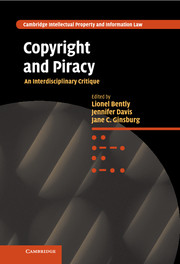Book contents
- Frontmatter
- Contents
- Notes on the contributors
- Editors' preface
- Table of cases
- Table of statutes
- Part I Introduction
- Part II History
- Part III Comparative Law
- Part IV Economics
- Part V Linguistics
- Part VI Computer software
- Part VII Information studies
- Part VIII Literature
- Part IX Art
- Part X Sociology/music
- Part XI Criminology
- 20 Copyright infringement: a criminological perspective
- 21 Towards a clearer understanding of the file-sharing phenomenon? Comments on a criminological perspective
- Bibliography
- Index
- References
20 - Copyright infringement: a criminological perspective
from Part XI - Criminology
Published online by Cambridge University Press: 17 November 2010
- Frontmatter
- Contents
- Notes on the contributors
- Editors' preface
- Table of cases
- Table of statutes
- Part I Introduction
- Part II History
- Part III Comparative Law
- Part IV Economics
- Part V Linguistics
- Part VI Computer software
- Part VII Information studies
- Part VIII Literature
- Part IX Art
- Part X Sociology/music
- Part XI Criminology
- 20 Copyright infringement: a criminological perspective
- 21 Towards a clearer understanding of the file-sharing phenomenon? Comments on a criminological perspective
- Bibliography
- Index
- References
Summary
Introduction
This chapter explores copyright infringement via Internet piracy as a new ‘crime’ of the twenty-first century, it outlines some of the limitations of traditional criminological theorizing about the causes of crime, and suggests that this new ‘crime’ has to be seen in the context of late modernity. Late modernity has brought with it new technology and a whole host of social transitions which perhaps blur conventional moralities, thus making Internet piracy much less of a ‘crime’ (in some people's eyes) than it would hitherto have been seen.
As David Wall and others have suggested, the introduction and extension of the Internet represents a seismic shift in social life. Criminologists have perhaps been slow to recognize that new forms of computer-mediated communication may be contemporary vehicles for criminality. Moreover, where there has been interest, the critical gaze of criminologists and socio-legalists has generally been directed towards the creation of hyper-criminal networks, fraud (including ‘phishing’), the dissemination of hate-related propaganda, stolen identities, cyber stalking and the extension of paedophile networks, with the latter tending to dominate media interest. Wall has suggested that there are now three generations of cybercrime: first, traditional or ordinary crimes using computers, second, hybrid cybercrimes whereby computer technology has created entirely new global opportunities, and third, true cybercrimes which are solely the product of the Internet. I am concerned with the second and third category of crimes, and I take music piracy as my prime example of copyright infringement in this chapter.
- Type
- Chapter
- Information
- Copyright and PiracyAn Interdisciplinary Critique, pp. 389 - 409Publisher: Cambridge University PressPrint publication year: 2010
References
- 1
- Cited by



